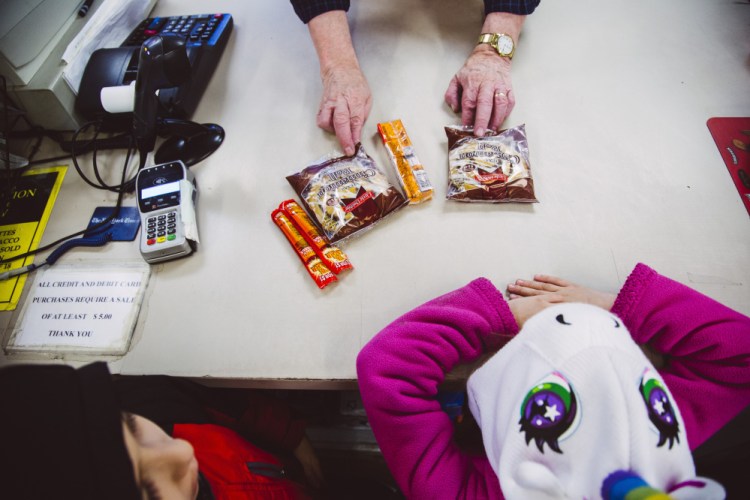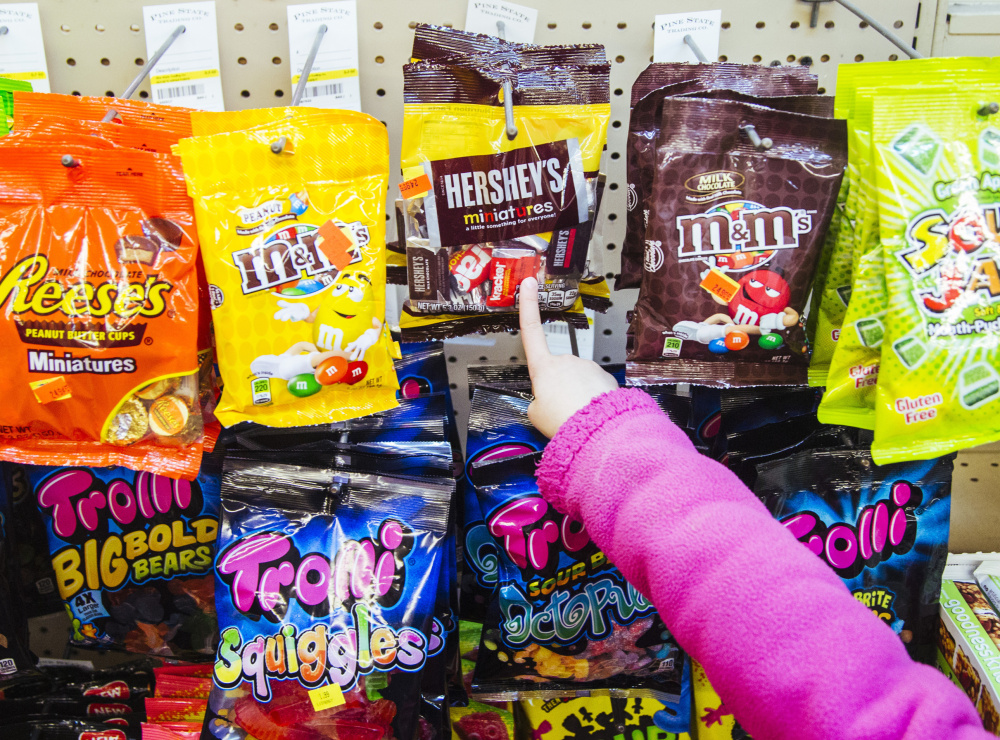The state Department of Health and Human Services is once again seeking to ban food stamp recipients from using their benefits to purchase candy and soda.
The department announced that it will seek a federal waiver to prohibit so-called junk food purchases within the Supplemental Nutrition Assistance Program, or SNAP. The move by the department follows several failed efforts to seek the waiver through legislation, including a bill that died in the Legislature this year. This time DHHS will pursue the change through rulemaking.
DHHS said Maine spent more than $115 million in medical claims related to obesity in its Medicaid program, and 88 percent of Medicaid recipients receive SNAP benefits. DHHS Commissioner Mary Mayhew said Monday that poor food choices lead to chronic health problems and “perpetuate a cycle of continued spending for health care services.”
“We believe that the banning of sugary drinks and candy from the SNAP program will make it that much easier for individuals and families to get on the road to healthy eating by making more dollars available for healthy purchases,” Mayhew said.
The U.S. Department of Agriculture, which funds and oversees the SNAP program, has never granted such a waiver despite requests by at least nine states. In 2011, the USDA rejected New York City’s request to prohibit food stamp users from buying soda and drinks high in sugar content, arguing that administrating such restrictions would overburden retailers without having a sufficient impact on reducing obesity and improving health.
Mayhew noted the USDA’s resistance to the change, saying it was time for the agency to “start walking the talk” when it promotes healthy food choices.
“We look forward to a swift and supportive decision by the federal government on our request and the implementation of this change within the SNAP program in the coming months,” she said.
Advocates for the poor, the soft-drink industry and the trade group representing grocers opposed the junk food bill when it came before the Legislature in April. Maine Equal Justice Partners, an advocacy group for low-income Mainers, cited a study by the Illinois Public Health Association that found restricting junk food purchases wouldn’t have the desired effect because SNAP recipients often use out-of-pocket cash to supplement their benefit allowance when buying food.
SNAP benefits are loaded on a state-issued EBT card, which is swiped at the point of purchase when recipients buy food. The same cards also can carry benefits under the Temporary Assistance for Needy Families program. But unlike TANF benefits, food stamp benefits cannot be converted into cash at an ATM. In July, about 201,689 Mainers were receiving SNAP benefits, according to DHHS.
Maine Equal Justice Partners’ Christine Hastedt said Monday that the junk food ban is an ineffective and potentially costly way to address a problem that affects the entire U.S. population. Additionally, she questioned why DHHS and the LePage administration continued to push proposals that are destined to be rejected by the federal government.
“Why do they keep trotting out this proposal, or similar proposals that they know isn’t going to get traction with the federal government and they know aren’t going to do a single thing about addressing the real problems that people living in poverty are facing?” Hastedt said.
“How are we to best improve the lives of Maine people and lift them from poverty?” she said. “Is it through this, that’s going nowhere, gets a lot of air time, but isn’t going to achieve anything? Or would you take a shot at solving the transportation problem, the wages problem? Those are the solutions to poverty in our view.”
The Maine Grocers and Food Producers Association also opposes the change. Shelley Doak, who represents the grocers group, said Monday that Maine should not go it alone in restricting certain foods from being purchased within a federal program. Doing so, she said, would create a patchwork of regulations across the states that would create logistical and compliance hurdles for grocers who run multiple locations across several states.
“There are ongoing conversations at the federal level about these kind of changes,” she said. “We feel that’s the appropriate place for this kind of change.”
In the face of USDA resistance, some states have begun to finesse their waiver requests. South Carolina, for example, has attempted to appeal to the USDA by proposing a pilot program, while Wisconsin has sidestepped an outright junk-food ban by proposing that food stamp beneficiaries be required to spend a specific dollar amount on healthy foods.
In 2012, the American Journal of Preventive Medicine found that soft drinks and sugar-sweetened beverages accounted for 58 percent of all refreshment beverage purchases by SNAP and the Women, Infants and Children, or WIC, programs. Nationwide, SNAP was estimated to pay at least $1.7 billion to $2.1 billion annually for sugar-sweetened beverages purchased in grocery stores, the study found.
Maine sent its waiver request to the USDA on Monday. The request notes that Maine has the highest obesity rate in New England and that its rate increased from 14 percent in 1995 to 65 percent in 2011.
Mayhew said the state will increase efforts to educate SNAP recipients about healthy food choices. The state spent $4.6 million on its SNAP nutrition education program in the 2015 fiscal year. The program is designed to teach low-income families how to prepare nutritious and affordable meals.
“Our current food stamp policy lets water in one end of the boat while bailing out the other,” Mayhew said. “If we’re going to spend millions on nutrition education for food stamp recipients, we should stop giving them money to buy candy and soda.”
DHHS noted that the American Medical Association recommended in 2013 that SNAP remove sugary drinks from its list of allowable items. The USDA has prohibited the purchase of “foods with minimal nutritional value” from its National School Lunch program.
DHHS plans to define candy in accordance with Maine’s sales tax law. That definition will change Jan. 1 as a result of the budget the Legislature passed in June. The budget broadened the definition of candy and soft drinks.
Candy is defined as “preparation of sugar, honey or other natural or artificial sweeteners in combination with chocolate, fruits, nuts or other ingredients or flavorings in the form of bars, drops or pieces.” That includes items such as Gummie Bears, jelly beans, chocolate, marshmallows, processed fruit snacks and sweetened baking chocolate. Soft drinks include nonalcoholic beverages that contain natural or artificial sweeteners, including soda, juice cocktails, juice drinks containing 50 percent or less of vegetable or fruit juice, lemonade, fruit punch, and energy and sports drinks. Soft drinks don’t include milk or milk products.
Ahmed Muse, who works at the Peace Food Market in Portland, said he often sees shoppers buying chocolate, sugary drinks or other snacks with EBT cards at the small Halal store. Muse said those purchases are often small, and speculated that many people use their food stamps to buy food for meals at supermarkets.
But Muse was familiar with the debate and said he personally would prefer not to see food stamp money go toward chocolate or unhealthy foods.
“I think it should go toward much better foods, not Mountain Dew, junk food or other things,” he said. “It should go towards meals.”
But Muse’s father, Abdulkadir, who also works at the store, pointed out such a change would “damage business” for such small shops, echoing a concern often voiced by retail shops.
Over at Mellen Street Market in Portland’s Parkside neighborhood, local resident Holly Plourde was buying an afternoon snack of crackers for her two young children. Plourde, who doesn’t receive food stamps, indicated she wouldn’t have a problem prohibiting the benefits from being used to buy candy, soda or other junk food.
“I think it’s a good idea,” she said. “It’s not very nutritious.”
Staff Writer Kevin Miller contributed to this report.
Send questions/comments to the editors.




Comments are no longer available on this story